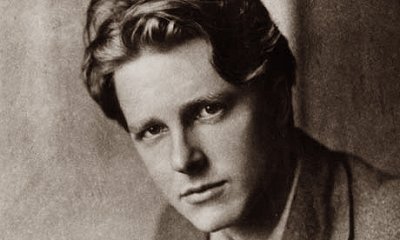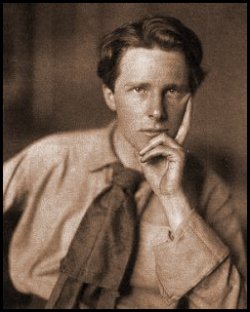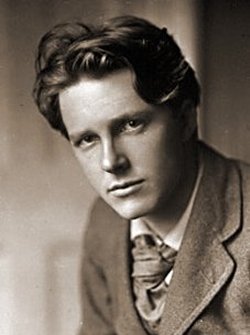Fleurs du Mal Magazine


Or see the index
![]()
Rupert Brooke
(1887-1915)
TIARE TAHITI
AMUA, when our laughter ends,
And hearts and bodies, brown as white,
Are dust about the doors of friends,
Or scent ablowing down the night,
Then, oh! then, the wise agree,
Comes our immortality.
Mamua, there waits a land
Hard for us to understand.
Out of time, beyond the sun,
All are one in Paradise,
You and Pupure are one,
And Taü, and the ungainly wise.
There the Eternals are, and there
The Good, the Lovely, and the True,
And Types, whose earthly copies were
The foolish broken things we knew;
There is the Face, whose ghosts we are;
The real, the never-setting Star;
And the Flower, of which we love
Faint and fading shadows here;
Never a tear, but only Grief;
Dance, but not the limbs that move;
Songs in Song shall disappear;
Instead of lovers, Love shall be;
For hearts, Immutability;
And there, on the Ideal Reef,
Thunders the Everlasting Sea!
And my laughter, and my pain,
Shall home to the Eternal Brain.
And all lovely things, they say,
Meet in Loveliness again;
Miri’s laugh, Teipo’s feet,
And the hands of Matua,
Stars and sunlight there shall meet
Coral’s hues and rainbows there,
And Teüra’s braided hair;
And with the starred tiare’s white,
And white birds in the dark ravine,
And flamboyants ablaze at night,
And jewels, and evening’s after-green,
And dawns of pearl and gold and red,
Mamua, your lovelier head!
And there’ll no more be one who dreams
Under the ferns, of crumbling stuff,
Eyes of illusion, mouth that seems,
All time-entangled human love.
And you’ll no longer swing and sway
Divinely down the scented shade,
Where feet to Ambulation fade,
And moons are lost in endless Day.
How shall we wind these wreaths of ours,
Where there are neither heads nor flowers?
Oh, Heaven’s Heaven! — but we’ll be missing
The palms, and sunlight, and the south;
And there’s an end, I think, of kissing,
When our mouths are one with Mouth …
Taü here, Mamua,
Crown the hair, and come away!
Hear the calling of the moon,
And the whispering scents that stray
About the idle warm lagoon.
Hasten, hand in human hand,
Down the dark, the flowered way,
Along the whiteness of the sand,
And in the water’s soft caress,
Wash the mind of foolishness,
Mamua, until the day.
Spend the glittering moonlight there
Pursuing down the soundless deep
Limbs that gleam and shadowy hair,
Or floating lazy, half-asleep.
Dive and double and follow after,
Snare in flowers, and kiss, and call,
With lips that fade, and human laughter
And faces individual,
Well this side of Paradise! …
There’s little comfort in the wise.
Source: Rupert Brooke. London: Sidgwick & Jackson, 1915
Rupert Brooke poetry
fleursdumal.nl magazine
More in: Archive A-B, Brooke, Rupert

Rupert Brooke
(1887-1915)
TIARE TAHITI
AMUA, when our laughter ends,
And hearts and bodies, brown as white,
Are dust about the doors of friends,
Or scent ablowing down the night,
Then, oh! then, the wise agree,
Comes our immortality.
Mamua, there waits a land
Hard for us to understand.
Out of time, beyond the sun,
All are one in Paradise,
You and Pupure are one,
And Taü, and the ungainly wise.
There the Eternals are, and there
The Good, the Lovely, and the True,
And Types, whose earthly copies were
The foolish broken things we knew;
There is the Face, whose ghosts we are;
The real, the never-setting Star;
And the Flower, of which we love
Faint and fading shadows here;
Never a tear, but only Grief;
Dance, but not the limbs that move;
Songs in Song shall disappear;
Instead of lovers, Love shall be;
For hearts, Immutability;
And there, on the Ideal Reef,
Thunders the Everlasting Sea!
And my laughter, and my pain,
Shall home to the Eternal Brain.
And all lovely things, they say,
Meet in Loveliness again;
Miri’s laugh, Teipo’s feet,
And the hands of Matua,
Stars and sunlight there shall meet
Coral’s hues and rainbows there,
And Teüra’s braided hair;
And with the starred tiare’s white,
And white birds in the dark ravine,
And flamboyants ablaze at night,
And jewels, and evening’s after-green,
And dawns of pearl and gold and red,
Mamua, your lovelier head!
And there’ll no more be one who dreams
Under the ferns, of crumbling stuff,
Eyes of illusion, mouth that seems,
All time-entangled human love.
And you’ll no longer swing and sway
Divinely down the scented shade,
Where feet to Ambulation fade,
And moons are lost in endless Day.
How shall we wind these wreaths of ours,
Where there are neither heads nor flowers?
Oh, Heaven’s Heaven! — but we’ll be missing
The palms, and sunlight, and the south;
And there’s an end, I think, of kissing,
When our mouths are one with Mouth …
Taü here, Mamua,
Crown the hair, and come away!
Hear the calling of the moon,
And the whispering scents that stray
About the idle warm lagoon.
Hasten, hand in human hand,
Down the dark, the flowered way,
Along the whiteness of the sand,
And in the water’s soft caress,
Wash the mind of foolishness,
Mamua, until the day.
Spend the glittering moonlight there
Pursuing down the soundless deep
Limbs that gleam and shadowy hair,
Or floating lazy, half-asleep.
Dive and double and follow after,
Snare in flowers, and kiss, and call,
With lips that fade, and human laughter
And faces individual,
Well this side of Paradise! …
There’s little comfort in the wise.
Source: Rupert Brooke. London: Sidgwick & Jackson, 1915.
Rupert Brooke poetry
kempis.nl poetry magazine
More in: Archive A-B, Brooke, Rupert

R u p e r t B r o o k e
(1887-1915)
Second Best
Here in the dark, O heart;
Alone with the enduring Earth, and Night,
And Silence, and the warm strange smell of clover;
Clear-visioned, though it break you; far apart
From the dead best, the dear and old delight;
Throw down your dreams of immortality,
O faithful, O foolish lover!
Here’s peace for you, and surety; here the one
Wisdom — the truth! — "All day the good glad sun
Showers love and labour on you, wine and song;
The greenwood laughs, the wind blows, all day long
Till night." And night ends all things.
Then shall be
No lamp relumed in heaven, no voices crying,
Or changing lights, or dreams and forms that hover!
(And, heart, for all your sighing,
That gladness and those tears are over, over. . . .)
And has the truth brought no new hope at all,
Heart, that you’re weeping yet for Paradise?
Do they still whisper, the old weary cries?
"’MID YOUTH AND SONG, FEASTING AND CARNIVAL,
THROUGH LAUGHTER, THROUGH THE ROSES, AS OF OLD
COMES DEATH, ON SHADOWY AND RELENTLESS FEET,
DEATH, UNAPPEASABLE BY PRAYER OR GOLD;
DEATH IS THE END, THE END!"
Proud, then, clear-eyed and laughing, go to greet
Death as a friend!
Exile of immortality, strongly wise,
Strain through the dark with undesirous eyes
To what may lie beyond it. Sets your star,
O heart, for ever! Yet, behind the night,
Waits for the great unborn, somewhere afar,
Some white tremendous daybreak. And the light,
Returning, shall give back the golden hours,
Ocean a windless level, Earth a lawn
Spacious and full of sunlit dancing-places,
And laughter, and music, and, among the flowers,
The gay child-hearts of men, and the child-faces
O heart, in the great dawn!
The Funeral of Youth: Threnody
The day that YOUTH had died,
There came to his grave-side,
In decent mourning, from the country’s ends,
Those scatter’d friends
Who had lived the boon companions of his prime,
And laughed with him and sung with him and wasted,
In feast and wine and many-crown’d carouse,
The days and nights and dawnings of the time
When YOUTH kept open house,
Nor left untasted
Aught of his high emprise and ventures dear,
No quest of his unshar’d —
All these, with loitering feet and sad head bar’d,
Followed their old friend’s bier.
FOLLY went first,
With muffled bells and coxcomb still revers’d;
And after trod the bearers, hat in hand —
LAUGHTER, most hoarse, and Captain PRIDE with tanned
And martial face all grim, and fussy JOY,
Who had to catch a train, and LUST, poor, snivelling boy;
These bore the dear departed.
Behind them, broken-hearted,
Came GRIEF, so noisy a widow, that all said,
"Had he but wed
Her elder sister SORROW, in her stead!"
And by her, trying to soothe her all the time,
The fatherless children, COLOUR, TUNE, and RHYME
(The sweet lad RHYME), ran all-uncomprehending.
Then, at the way’s sad ending,
Round the raw grave they stay’d. Old WISDOM read,
In mumbling tone, the Service for the Dead.
There stood ROMANCE,
The furrowing tears had mark’d her rouged cheek;
Poor old CONCEIT, his wonder unassuaged;
Dead INNOCENCY’s daughter, IGNORANCE;
And shabby, ill-dress’d GENEROSITY;
And ARGUMENT, too full of woe to speak;
PASSION, grown portly, something middle-aged;
And FRIENDSHIP — not a minute older, she;
IMPATIENCE, ever taking out his watch;
FAITH, who was deaf, and had to lean, to catch
Old WISDOM’s endless drone.
BEAUTY was there,
Pale in her black; dry-eyed; she stood alone.
Poor maz’d IMAGINATION; FANCY wild;
ARDOUR, the sunlight on his greying hair;
CONTENTMENT, who had known YOUTH as a child
And never seen him since. And SPRING came too,
Dancing over the tombs, and brought him flowers —
She did not stay for long.
And TRUTH, and GRACE, and all the merry crew,
The laughing WINDS and RIVERS, and lithe HOURS;
And HOPE, the dewy-eyed; and sorrowing SONG; —
Yes, with much woe and mourning general,
At dead YOUTH’s funeral,
Even these were met once more together, all,
Who erst the fair and living YOUTH did know;
All, except only LOVE. LOVE had died long ago.

I. Peace
Now, God be thanked Who has matched us with His hour,
And caught our youth, and wakened us from sleeping,
With hand made sure, clear eye, and sharpened power,
To turn, as swimmers into cleanness leaping,
Glad from a world grown old and cold and weary,
Leave the sick hearts that honour could not move,
And half-men, and their dirty songs and dreary,
And all the little emptiness of love!
Oh! we, who have known shame, we have found release there,
Where there’s no ill, no grief, but sleep has mending,
Naught broken save this body, lost but breath;
Nothing to shake the laughing heart’s long peace there
But only agony, and that has ending;
And the worst friend and enemy is but Death.
II. Safety
Dear! of all happy in the hour, most blest
He who has found our hid security,
Assured in the dark tides of the world that rest,
And heard our word, `Who is so safe as we?’
We have found safety with all things undying,
The winds, and morning, tears of men and mirth,
The deep night, and birds singing, and clouds flying,
And sleep, and freedom, and the autumnal earth.
We have built a house that is not for Time’s throwing.
We have gained a peace unshaken by pain for ever.
War knows no power. Safe shall be my going,
Secretly armed against all death’s endeavour;
Safe though all safety’s lost; safe where men fall;
And if these poor limbs die, safest of all.
III. The Dead
Blow out, you bugles, over the rich Dead!
There’s none of these so lonely and poor of old,
But, dying, has made us rarer gifts than gold.
These laid the world away; poured out the red
Sweet wine of youth; gave up the years to be
Of work and joy, and that unhoped serene,
That men call age; and those who would have been,
Their sons, they gave, their immortality.
Blow, bugles, blow! They brought us, for our dearth,
Holiness, lacked so long, and Love, and Pain.
Honour has come back, as a king, to earth,
And paid his subjects with a royal wage;
And Nobleness walks in our ways again;
And we have come into our heritage.
IV. The Dead
These hearts were woven of human joys and cares,
Washed marvellously with sorrow, swift to mirth.
The years had given them kindness. Dawn was theirs,
And sunset, and the colours of the earth.
These had seen movement, and heard music; known
Slumber and waking; loved; gone proudly friended;
Felt the quick stir of wonder; sat alone;
Touched flowers and furs and cheeks. All this is ended.
There are waters blown by changing winds to laughter
And lit by the rich skies, all day. And after,
Frost, with a gesture, stays the waves that dance
And wandering loveliness. He leaves a white
Unbroken glory, a gathered radiance,
A width, a shining peace, under the night.
V. The Soldier
If I should die, think only this of me:
That there’s some corner of a foreign field
That is for ever England. There shall be
In that rich earth a richer dust concealed;
A dust whom England bore, shaped, made aware,
Gave, once, her flowers to love, her ways to roam,
A body of England’s, breathing English air,
Washed by the rivers, blest by suns of home.
And think, this heart, all evil shed away,
A pulse in the eternal mind, no less
Gives somewhere back the thoughts by England given;
Her sights and sounds; dreams happy as her day;
And laughter, learnt of friends; and gentleness,
In hearts at peace, under an English heaven.
Rupert Brooke (1914)
More in: Brooke, Rupert
Thank you for reading Fleurs du Mal - magazine for art & literature